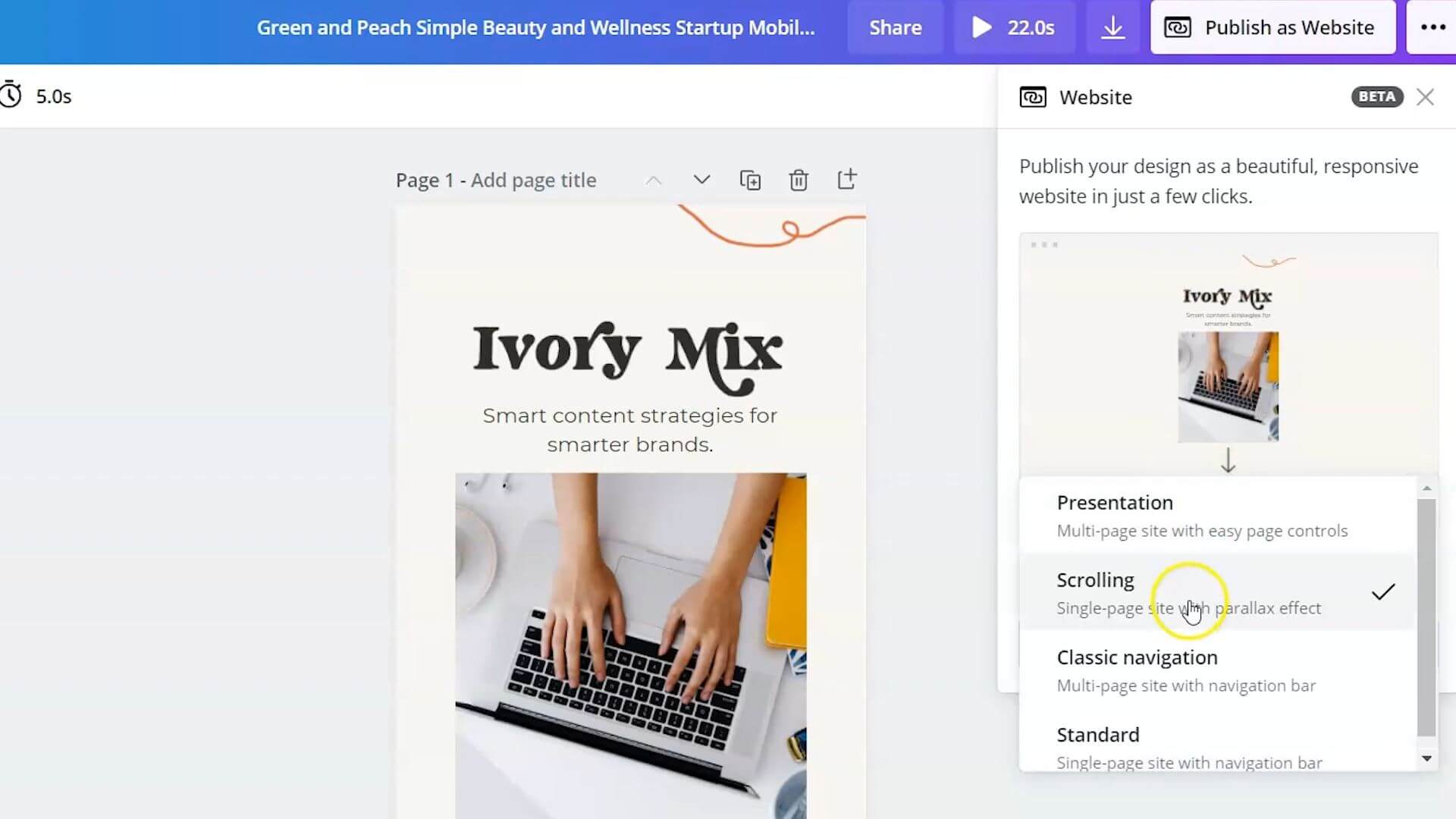Publishing a Canva website makes it live on the internet. Users can access it through a unique URL.
Creating a website with Canva is straightforward and user-friendly. Canva offers a variety of customizable templates, making it accessible for beginners. Once the design is complete, publishing the website is just a click away. Canva ensures that the site is mobile-responsive, which is crucial for user experience and SEO.
The platform also provides options for integrating social media links and other interactive elements. This approach saves time and effort, allowing users to focus on content and design. Canva’s intuitive interface and comprehensive tools make website creation accessible to all, regardless of technical expertise.

Credit: ivorymix.com
Introduction To Canva Websites
Canva is a popular design tool. It lets anyone create stunning visuals. Recently, Canva introduced a new feature: Canva Websites. This tool is a game-changer. It allows users to design and publish websites easily. No coding skills are required.
Ease Of Use
Canva Websites are user-friendly. Drag-and-drop functionality makes design simple. You can start with a template or a blank page. The interface is intuitive. There are minimal learning curves for beginners. Editing elements is straightforward. You click, drag, and drop. This ease of use makes Canva Websites accessible to everyone.
Features For Web Design
Canva offers numerous features for web design. Here are some key features:
- Customizable Templates: Choose from a variety of templates.
- Responsive Design: Websites look great on all devices.
- Drag-and-Drop Editor: Easily move elements around.
- Multimedia Integration: Add images, videos, and audio files.
- SEO Tools: Optimize your site for search engines.
Here is a table highlighting some key features:
| Feature | Description |
|---|---|
| Customizable Templates | Select from pre-designed templates. |
| Responsive Design | Websites adjust to different screen sizes. |
| Drag-and-Drop Editor | Move elements with ease. |
| Multimedia Integration | Incorporate various media types. |
| SEO Tools | Improve your site’s visibility. |
These features make Canva Websites a powerful tool. It is suitable for beginners and professionals. You can create a stunning website in minutes. The process is seamless and enjoyable.
Publishing Process On Canva
Publishing a website on Canva is a user-friendly experience. Canva provides a streamlined process that makes it easy for anyone to get their website online. Whether you are a small business owner or a hobbyist, Canva simplifies the steps to go live.
Steps To Go Live
- Create Your Design: Start by designing your website using Canva’s drag-and-drop editor.
- Preview Your Site: Click the ‘Preview’ button to see how your site looks.
- Click Publish: Once satisfied, hit the ‘Publish’ button on the top-right corner.
- Choose Domain: Select a free Canva domain or use a custom one.
- Confirm Settings: Double-check your settings and confirm.
Customizing Domain Settings
Customizing your domain settings on Canva is straightforward. Canva allows you to use a free Canva subdomain or connect your own custom domain. This flexibility ensures that your website can reflect your unique brand.
| Option | Description |
|---|---|
| Free Canva Subdomain | Use a free subdomain provided by Canva, e.g., yoursite.canva.com |
| Custom Domain | Connect your own domain for a professional look. |
- Free Canva Subdomain: Perfect for beginners or personal projects.
- Custom Domain: Ideal for businesses and professional sites.
To connect a custom domain, follow these steps:
- Go to the ‘Custom Domain’ section in Canva.
- Enter your domain name and follow the prompts.
- Update your DNS settings as instructed by Canva.
- Wait for the changes to propagate, which may take up to 48 hours.
Once completed, your website will be live with your chosen domain.
Visibility And Accessibility
Publishing a Canva website is exciting! It opens new doors for Visibility and Accessibility. Your content reaches a larger audience. Here’s how your site can shine.
Search Engine Appearance
Canva websites are SEO-friendly. Search engines can index your site quickly. Use relevant keywords in your content. This helps search engines understand your site.
Meta tags are also crucial. Canva allows adding meta descriptions and titles. These tags improve your site’s search appearance. Ensure to use clear and descriptive meta tags.
Proper use of headings (H1, H2, H3) is essential. Headings structure your content. Search engines read these to understand your site’s hierarchy. Use headings wisely for better SEO.
Sharing Across Platforms
Once published, your Canva website is easy to share. Share your site link on social media. This boosts your site’s visibility. More people will visit your site.
Email marketing is another great tool. Include your site link in newsletters. This encourages your subscribers to visit your site.
Collaboration is made simple. Share your Canva design with team members. They can view and edit the design, ensuring consistency.
Embedding your website link in other platforms is beneficial. Blogs, forums, and directories are good places. This generates more traffic to your site.
| Platform | How to Share |
|---|---|
| Post your site link with a catchy description. | |
| Tweet your link with relevant hashtags. | |
| Share your link in groups and posts. | |
| Include your site link in your email signature. |
These strategies increase your site’s reach. They drive more visitors to your Canva website. Visibility and accessibility are key to online success.

Credit: www.canva.com
Maintaining Your Canva Website
After publishing your Canva website, keeping it updated is crucial. Regular maintenance ensures your site runs smoothly and stays relevant. This section covers the essentials of maintaining your Canva website.
Updating Content
Updating content is key for a successful website. Fresh content keeps visitors engaged and improves SEO. Follow these tips for updating your Canva website:
- Regularly add new blog posts to keep your audience informed.
- Update images and graphics to reflect current trends.
- Revise outdated information to keep it accurate.
- Check links to ensure they are working correctly.
By keeping your content fresh, you attract more visitors and improve your site’s performance.
Managing Site Performance
Managing site performance is essential for user experience. A fast-loading website retains visitors and ranks higher on search engines. Here are some tips:
- Optimize images to reduce load times.
- Use a content delivery network (CDN) to speed up content delivery.
- Regularly monitor site speed using tools like Google PageSpeed Insights.
- Minimize the use of heavy scripts and plugins.
By focusing on these aspects, you ensure a smooth and fast user experience on your Canva website.
Analytics And Feedback
Once you publish a Canva website, you gain access to valuable analytics. These insights help you understand how visitors interact with your site. Knowing this information is crucial for making informed improvements. Let’s dive into two key areas: Tracking Visitor Behavior and Using Insights for Improvement.
Tracking Visitor Behavior
Tracking visitor behavior helps you know what visitors do on your site. You can see which pages they visit and how long they stay. This information tells you what content is most engaging. You can also identify where visitors drop off, indicating areas that may need improvement.
- Page Views: See how many times each page is viewed.
- Session Duration: Understand how long visitors stay on your site.
- Click-Through Rate: Track which buttons or links get the most clicks.
- Bounce Rate: Know the percentage of visitors who leave after viewing one page.
These metrics offer a snapshot of your website’s performance. They help you understand visitor preferences and behaviors.
Using Insights For Improvement
Use the gathered insights to make your website better. Focus on the most visited pages. Enhance their content and visuals. Improve the areas where visitors drop off.
- Content Optimization: Update content to make it more engaging.
- Design Tweaks: Adjust design elements to improve user experience.
- Call-to-Action (CTA): Make CTAs clearer and more compelling.
- Loading Speed: Ensure your website loads quickly to retain visitors.
Implementing these changes can help increase visitor engagement. Your website will become more effective and user-friendly.

Credit: www.youtube.com
Frequently Asked Questions
What Does It Mean To Publish A Website On Canva?
Publishing a website on Canva means creating and launching a website using Canva’s design tools. It allows for customization and easy updates.
Can You Edit A Canva Website After Publishing?
Yes, you can edit a Canva website after publishing. Simply log in to your Canva account, make changes, and republish.
Can I Monetize My Canva Website?
Yes, you can monetize your Canva website. Use affiliate links, sell digital products, or offer paid memberships.
How Do I Publish A Canva Website To My Domain?
To publish a Canva website to your domain, first design your site. Click “Publish,” choose “Domain,” then connect or buy a domain. Follow the prompts to complete the process.
Conclusion
Publishing a Canva website offers numerous benefits and opportunities. It simplifies website design, making it accessible to everyone. With user-friendly features, you can create a professional online presence. Embrace the ease of Canva websites and elevate your brand effortlessly. Start your journey today and watch your digital footprint grow.


